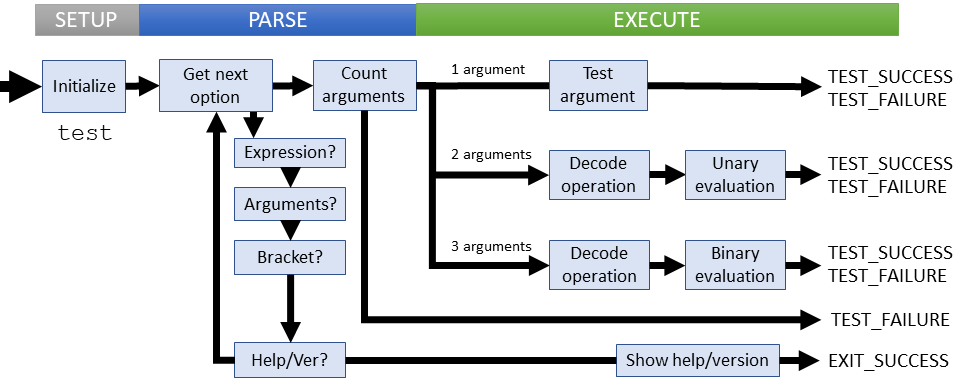[GNU Manual] [POSIX requirement] [Linux man] [FreeBSD man]

Summary
test - check file types and compare values
Lines of code: 886
Principal syscall: None
Support syscalls: None
Options: 2 (hardcoded checks for --help and --version)
Descended from stty introduced in Version 7 UNIX (1979)
Added to Shellutils in October 1992 [First version]
Number of revisions: 178
The test utility departs from typical utilities by using a custom parser to evaluate expressions with special return values. Note that test is the general implementation of the '[' lbracket utility.
Helpers:advance()- Updates argument position and compares countand()- Evaluates AND operations (-a term)beyond()- Throws a syntax error for missing argumentsbinary_operator()- Evaluates the valid binary operatorsbinop()- Tests for a valid binary operatorexpr()- Evaluates expression termsfind_int()- Finds a pointer to the start of a numberget_mtime()- Tests for and locates file modification timeone_argument()- Produce for a single argument test, simple non-null testor()- Evaluates OR operations (-o)posixtest()- The top-level procedure for testterm()- Parses an input term and returns the evaluationtest_main_return()- Function-like macro for the utility return valuetest_syntax_error()- Throws a syntax errortest_unop()- Verifies a given unary operatorthree_arguments()- Produce for a three argument test, binary operatortwo_arguments()- Produce for a two argument test, unary operatorunary_advance()- Tests and updates argument positionunary_operator()- Evaluates the valid unary operators
die()- Exit with mandatory non-zero error and message to stderrerror()- Outputs error message to standard error with possible process termination
Setup
test keeps several variables as globals, the most important is pos, which is the index to the current argument under evaluation. The other globals are the expected argc, and **argv
main() introduces one important variable, value, which holds the eventual return value of the utility.
Parsing
Parsing for test is different from many other utilities in that it doesn't support any utility-level options or doesn't even use Getopt. It does hardcode a check for the help/version output.
Since the purpose of the utility is to parse and evaluate the command line, these tasks fall under the execution section. At a minimum, we confirm that there are no more than three arguments provided by the user as the only failure condition
Execution
test evaluates a single expression, which may contain of to 3 arguments. Each of these considers a different control flow:
- The 1 argument expression checks that the argument is NULL or not and returns the truth of the check
- The 2 argument expression assumes an op code and an argument. These include the file type checks and the access permission checks
- The 3 argument expression assumes an op code and two arguments. These types include numeric and some string comparisons
Failure cases:
- Unknown operation provided
- Missing arguments
- Unbalanced bracket usage
- Unexpected argument types
All failures at this stage output an error message to STDERR and return without displaying usage help